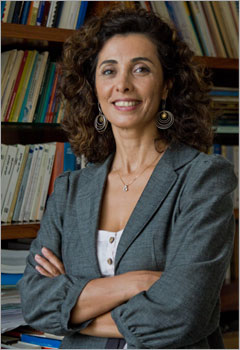
Executive Director
Mrs. Rita Maalouf, the executive director of Shamaa, graduated with a master’s degree in information sciences from the École de bibliothéconomie et des sciences de l’information (EBSI) of Montreal University, Canada, with specialization in the management of electronic information, after obtaining a B.A. in Documentation from the Lebanese University in Beirut.
Mrs. Maalouf is a college instructor at the Lebanese University, Faculty of Information and Documentation, where she teaches courses on general and specialized information sources and resources. She has held the position of Shamaa’s executive director since its inception in 2007. Prior to that, she held, for three years, a leading position within the European Commission funded project on the Rehabilitation of the Lebanese National Library. Mrs. Maalouf is member of the Lebanese Library Association (LLA), the Corporation des bibliothécaires professionnels du Québec (CBPQ), the Association internationale francophone des bibliothécaires et documentalistes (AIFBD), and, until recently, the Special Library Association (SLA). She has presented papers at various regional and international professional conferences.
Mrs. Rita Maalouf has been the executive arm of the Shamaa founding body since its inception in 2007. She was first called by the Executive Committee to assess the initial steps undertaken to start Shamaa activities. Her report led to the development of a first strategic plan that was adopted by the Committee, and she was requested to implement the proposed realignment to reflect the goals and programs of this plan. The actions undertaken led to major changes for the organization that have paved the way for Shamaa to become an independent organization in 2010.
As outlined, the plan consisted of several strategic actions, among which the choice of a high performing data base management system, the development of a specialized tri-lingual thesaurus (Arabic, English, French), the building of strategic partnerships with various data providers across the Arab countries and improvement of data collection, the addition of abstracts and full texts, and the development of the database interface to make it more responsive to the needs of users.
In a spring 2012 interview, Maalouf observed, “When I arrived, I found that the Shamaa founders were very committed to building on scientific leadership in education and to finding the best way to get that voice better heard by the educational scientific community in the Arab countries. Since then, I think we’ve made a good deal of progress”. She added that she has hope for more progress, “now that Shamaa can count on a highly qualified and dedicated team composed of both librarians and education specialists”, concluding that “with its foundations strengthened and a new strategic plan developed, Shamaa will continue to serve scientists, policymakers, and the general public, and expand its impact by broadening the use of social media to reach potential users”.


